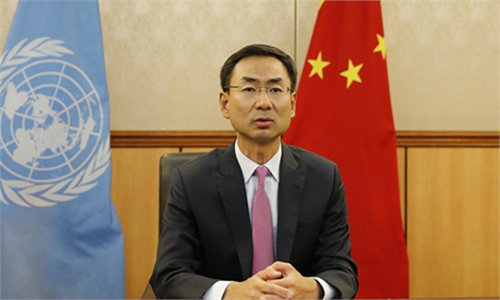US aid to Ukraine may decline with fiercer political battles in election period: expert
Policies to be decided ‘based on partisan interests as election nears’

US President Joe Biden walks with Ukraine's President Volodymyr Zelensky through the colonnade of the White House, in Washington, DC on December 21, 2022. Photo: AFP
While Democrats and Republicans in the US Senate are deadlocked over a bill for $110.5 billion in funds for Ukraine, prospects of the US maintaining aid for Ukraine are dim amid fiercer political battles in the election period, analysts said.
Senate Republicans voted unanimously on Wednesday to block the bill granting $110.5 billion in funding for Ukraine, Israel, and other security needs in order to press their demands for more control over immigration via the US border with Mexico. US Senate leaders pledged on Thursday to continue trying to reach an agreement to provide billions of dollars in new security aid to Ukraine but with no result, Reuters reported.
US President Joe Biden berated the Republicans' blocking of the bill as "stunning" and dangerous, and warned that this setback in Ukraine aid would be a "gift" to Russia, while some US politicians even said the US would be "responsible for Ukraine's defeat."
The decrease in funding from the US was expected. In terms of partisan interests, the Republicans object to continuing to assist Ukraine as it would benefit Biden and the Democratic Party, Cui Heng, an assistant research fellow from the Center for Russian Studies of East China Normal University, told the Global Times.
Also, general opposition has grown within the US domestically as there has been no significant progress on the battlefield despite the large amount of funds invested, while various corruption scandals within the Ukrainian government have been exposed, said Cui.
As the election season approaches, US assistance to Ukraine will continue to decrease, and all international and domestic policies will be assessed and determined in accordance with the interests of each party. There are also growing concerns about why the government is funding the war in Ukraine rather than using the funds to stimulate the economy, analysts said.
Following a meeting with UK Foreign Secretary David Cameron on Thursday, US State Secretary Antony Blinken claimed that 90 percent of US investment in Ukraine have actually been spent in the US with manufacturers and have produced employment at home.
Aside from the US, European countries that initially promised significant support for Ukraine have scaled down their support, said Cui, noting that Ukraine has been facing significant difficulties in foreign aid recently.
Data from the Germany-based Kiel Institute's Ukraine aid tracker showed that new military, financial and humanitarian aid pledged to Ukraine between August and October 2023 fell almost 90 percent compared with the same period in 2022, reaching its lowest point since the start of the war in February 2022. In the European Union, negotiations worth $53 billion for Ukraine over the next four years were dragging on.
When the conflict between Russia and Ukraine initially broke out, countries like the US and Germany used the banner of supporting Ukraine against aggression to gain political points domestically and persuade their citizens to support aid. But with the initial enthusiasm fading, they have to face a more realistic struggle domestically and it is almost impossible to continue increasing aid to Ukraine or even maintain the previous level, said Cui.
Given that the conflict is at a standstill, the reduction of aid to Ukraine may not have an immediate impact. But the possibility for negotiations may increase, said Cui.
Lü Xiang, a research fellow at the Chinese Academy of Social Sciences, told the Global Times that the failure to pass the aid bill in the US also sends a clear message, leading to a loss of credibility both domestically and internationally.



